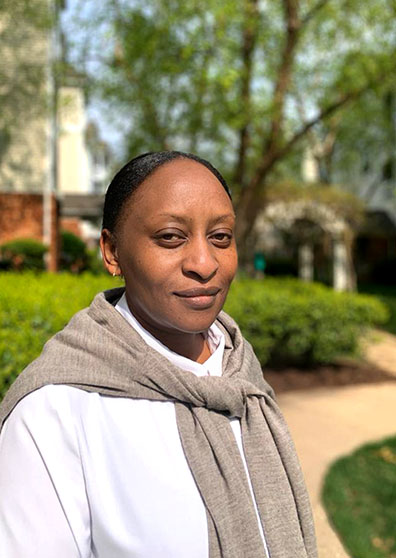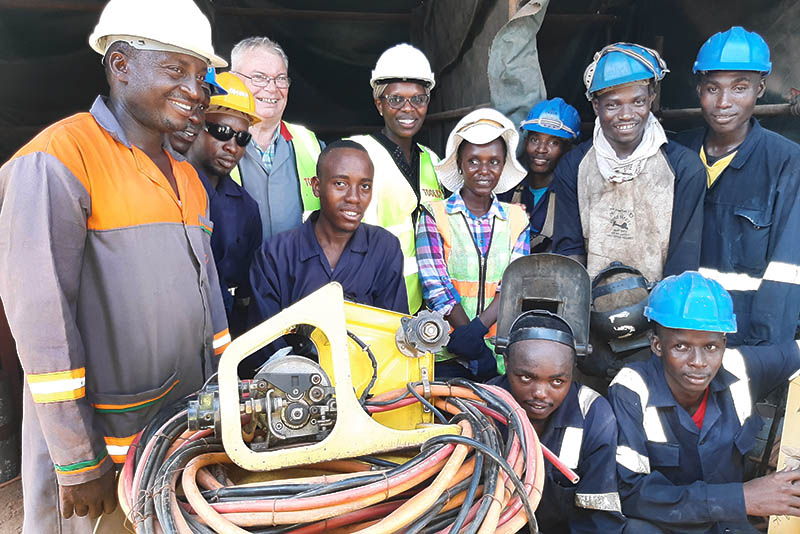By Christine Wambaa
My family and I are safe and are adjusting to working from home in a suburb of Washington, D.C. But I wonder—constantly—about whether my family and friends back home in Kenya are safe and able to keep their jobs. What is happening with the private sector and its millions of jobs? What if, for instance, you’re a driver of a matatu, one of those colorful mini-buses? How could they work during this period of physical distancing?
Kenya, like most countries in Africa, has been in lockdown since late March, shutting down all international flights. With only 18 percent of households with Internet access and more than 80 percent of the Kenyan workforce in the informal sector, there’s no doubt that the pandemic will hit my country’s economy hard.
 So, I started calling family and friends. One put me in touch with Paul Mbogo, the owner of four matatus.
So, I started calling family and friends. One put me in touch with Paul Mbogo, the owner of four matatus.
Mbogo told me on a recent Friday that he’s struggling. "For the 25-seater, we have been asked to reduce the number of passengers to 15. I grounded one vehicle because there is no business. It consumes a lot of fuel, because it is a large vehicle. And now it does not get customers because people are not going to work," he said.
His daily income has dropped from $120 to $10. His six employees, drivers and conductors, are each making $5 on a good day. His loan repayments are late. He risks losing two of his vehicles.
A few days later I called him back, and he said he had pulled a second vehicle from operation. Just two were still on their routes, and he was driving one. “The vehicle is consuming more than it is making profit. Like yesterday, I spent the whole day on the road, the vehicle consumed $25 in fuel. I was working for myself, I got $8. I cannot blame anyone and say they stole. I was there myself. So, all I can do is to take care of myself. I have to carry on—what else can I do?”
Next, I reached a friend, Jane Muigai Kamphius, who runs a social enterprise business, Toolkit iSkills. Her company trains artisans and places them in jobs. In a week, she laid off 70 of her 200 employees, shutting down two of her five projects. Many of her laid-off workers traveled back to their homes in Mombasa, Kenya’s second largest city.
She sounded disheartened over the telephone and worried about her workers. "Making it home you have to undergo 14 days of quarantine. There is no income for those 14 days and clearly, there are no prospects for jobs because nobody is going to recruit them when there is a lockdown.
“So, for us, from a business perspective, that has been the most challenging thing. It's like turning off a bulb—you have light one minute and then the next minute you don't," she said.

Toolkit iSkills trainees during welding master class. Photo: Courtesy of Toolkit iSkills
When I listen to people back home, I see the real risk for many of falling back into poverty in a country where already 36 percent of the population lives in extreme poverty. I called a former classmate Robert Kamau, an actor, who told me artists are ready to ignore physical distancing—to put food on the table.
"It's a mess. It’s a disastrous situation because artists are remunerated only after providing their services. For an artist, if you don't provide, then you don't eat," he said.
Kamau said some of his colleagues have remained in seclusion, while others decided not to. “Before the first cases were reported, there were some artists, who, due to the nature of their work, usually go to camps to produce series of episodes. Those guys have been continuing,” Kamau said.
I talked to several others and heard more stories. Water running infrequently in informal settlements. People not being able to wash their hands often. Some private schools offering online teaching. But for public schools, there’s nothing, no online classes. Learning has stopped.
My friend Jane was outraged by this, that only those with the financial means benefit from education: "I think the biggest shock is that the concept (of learning during COVID-19) assumes digital literacy. It assumes connectivity at home. It assumes one has a computer or a smartphone or an iPad.”
I know that Jane and my friends and acquaintances will mostly get through this crisis. But what will await them post COVID-19? An acquaintance connected me to Caroline Karuga, who leads Kenya Private Sector Alliance, an association that represents businesses in negotiations with the government.
"We are looking at protecting jobs. But we are also looking at new industries and then we are looking at recovery. And saying what will the economy look like, how will business look like after COVID,” she told me. The government recently reduced a tax for small and medium-sized enterprises from 3 percent to 1 percent. That will help some businesses, she said.
Jane, too, said that some tech businesses are cutting back on charges or giving away services free of charge for now. “Some of the partners have offered free online training,” she said. “That has given a line of hope. It’s a lifeline for those that could not afford paid online training.”
The calls back home help me understand more about what people are doing to stay safe and keep their jobs. I was heartened by Jane’s word “lifeline,” and I know my friends are incredibly resilient. But still I worry. I will keep calling.
Christine Wambaa is an IFC communications officer who grew up in Kiambu, Kenya.
Published in April 2020
